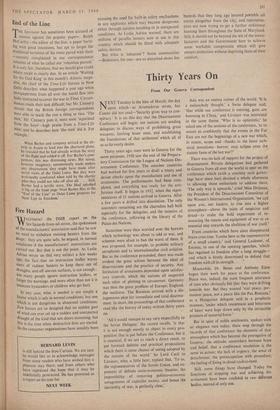Fire Hazard
VVELCOMING' the DSIR report on the fire hazards from oil stoves, the spokesman of the manufacturers' association said that he saw no need to withdraw existing heaters from the shops: they are quite safe, he argued, in normal conditions if the manufacturers' instructions are carried out. But that is not the point. As Leslie Adrian wrote on this' very subject a few weeks ago, the fact that an instruction leaflet warns users of radiant heaters to keep them out of draughts, and off uneven surfaces, is not enough : top many people ignore instruction leaflets, or forget the warnings, and more often than not it is innocent bystanders or children who get hurt.
In any case, what is needed is not simply a heater which is safe in normal conditions, but one Which is not dangerous in abnormal conditions. Few houses are so designed that no sudden gust of wind can ever set up a sudden and unexpected draught of the kind that sets doors slamming; but this is the time when destructive fires are started. So the consumer organisations have sensibly been stressing the need for built-in safety mechanisms in any appliance which may become dangerous either through careless handling or in unexpected conditions. As Leslie Adrian warned, there are millions of paraffin heaters now in use in this country which should be fitted with adequate 'safety devices.
But what is `adequate'? Some communities —Baltimore, for one—are so disturbed about fire hazards. that they long ago banned portable oil stoves altogether from the city; and representa- tives are now trying to get a. further ordinance banning them throughout the State of Maryland. Still, it should not be beyond the wit of the manu- facturers and the Government here to achieve some workable compromise which will give owners protection without depriving them of their comfort.










































 Previous page
Previous page